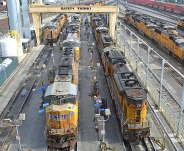Union Pacific on September 26, 2014, received an order from the U.S. Occupational Safety and Health Administration to reinstate and pay punitive damages to a rail yard worker it had illegally suspended for reporting safety problems. In announcing its ruling in the whistleblower case, the agency noted that the rail corporation had been cited a total of 11 times since the beginning of 2011 for similar episodes of workplace safety violations and employee retaliation.
The employee was sent home without pay after using his smartphone to record an air compressor aboard a locomotive failing a performance test while being serviced in the Carson, California (CA), yard. He took the footage after previously reporting the potentially dangerous piece of equipment to supervisors and being told that no repair or other action was required.
OSHA is requiring the railroad to provide the worker with back pay and present him with an additional $51,000 in punitive damages. Ken Atha, OSHA’s regional manager for San Francisco, explained the award this way: “Recording safety inspections on locomotives is protected by federal law. Workplace protections, such as these, ensure transparency, accountability, and freedom to raise safety concerns in the workplace without fear of retaliation.”

More stridently, a blogger for the L.A. Biz website asked, “What is wrong with you, Union Pacific? You should be rewarding the employees that bring safety issues to your attention, not punishing them. If railroads are truly a 21st Century transportation solution, they need to stop acting like it’s the 19th Century.”
As a Virginia-based personal injury lawyer who has helped railroad workers injured and made ill on the job for nearly three decades, I share that commenter’s outrage. Rail companies need to take all identifiable risks to their employees’ health and lives seriously. Not doing so is not merely unethical and illegal. When avoidable accidents occur in rail yards and on trains, the financial losses and the damage to corporate reputation often far outstrip the costs that would be incurred by just fixing the problem.
Sadly, the records of every railroad, including Norfolk Southern and CSX, which operate most frequently in my area of the country, illustrate that they refuse to learn this lesson. I’m glad that an agency such as OSHA exists to compel the companies to eventually do the right thing.
EJL





